If you enjoyed this edition of Voices - please forward to others who may be interested. | |
|
|
|
|
|
|
OF An Army VETERAN
Dec 2017
|
|
|
|
|
|
Riddick, Angelo COL
|
|
| Status |
Service Years |
|
|
|
USA Retired
|
1979 - 2014
|
|
|
| MOS |
|
|
53A-Information Systems Management
|
|
|
| Primary Unit |
|
|
2012-2014, US Army Cyber Command (2nd Army)
|
|
|
|
|
|
|
|
Record Your own Service Memories
By Completing Your Reflections!
|
|
|
Service Reflections is an easy-to-complete self-interview, located on your TWS Profile Page, which enables you to remember key people and events from your military service and the impact they made on your life.
|
|
|
|

|
|
|
|
| |
| |
|
Please describe who or what influenced your decision to join the Army?
|
| |
 |
| Ft. Knox, Kentucky summer '79. ROTC Basic Camp Cadet |
I grew up in Norfolk, Virginia. The military proved to be a big influence and quite frankly it was inescapable. In my teenage years, many friends dropped out of high school to join the military. Most joined the Navy and a few joined other services. One, in particular, a high school graduate joined the Coast Guard.
In the early 70's, I recall seeing veterans return in all conditions. Most sported large afros and rebelled against the service. Many fell victim to drug abuse which resulted in all types of bad behavior and the streets of Norfolk reflected the times for sure. I avoided most of the older veterans because they seemed angry and disenchanted with the government. It was a time of transition for most Blacks in the country and attitudes varied about the military, however, Norfolk's large military community made it palatable, to say the least.
Many of my friends joined Navy Junior Reserve Officers Training (NJROTC) in high school. Because we moved to the suburbs for a short stint in Chesapeake, Virginia, I was forced to join the Air Force Junior Reserve Officers Training Corps (AFJROTC) because Navy was not an option in that school district. I also joined the Junior Varsity football team which would become a big move in later years.
We moved back to Norfolk for 2 years and I finally got a chance to don the NJROTC uniform. At that point, I was hooked on being a service member but I couldn't wrap my head around enlisting because I looked at it from a different perspective. Most friends who joined the military at that time dropped out of high school and trudged around for a bit until finding a recruiter who gladly ushered them into service. I didn't think that was the life I wanted to lead and tried to stay in school despite the challenges presented by disenchanted family members and trials in the rough streets of Norfolk.
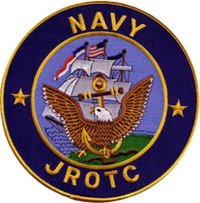 NJROTC instilled a sense of discipline and I met a life-long mentor and friend while enrolled in the program. Mr. Paul Evans was our NJROTC instructor. A former Chief Warrant Officer who served for nearly 21 years of active duty, was the driving force behind my high school's junior ROTC program. The unit was led by CAPT(R) Blanchard an old crusty senior Officer who joined the US Navy during WWII. He didn't get involved with the cadets like Mr. Evans and mainly worked in the background. Despite his flaws, I still looked up to him and was impressed with the stripes on his sleeves and more so with the reaction of the enlisted troops at the gate who would render the most professional salutes to him and Mr. Evans whenever we traveled to the local naval base. NJROTC instilled a sense of discipline and I met a life-long mentor and friend while enrolled in the program. Mr. Paul Evans was our NJROTC instructor. A former Chief Warrant Officer who served for nearly 21 years of active duty, was the driving force behind my high school's junior ROTC program. The unit was led by CAPT(R) Blanchard an old crusty senior Officer who joined the US Navy during WWII. He didn't get involved with the cadets like Mr. Evans and mainly worked in the background. Despite his flaws, I still looked up to him and was impressed with the stripes on his sleeves and more so with the reaction of the enlisted troops at the gate who would render the most professional salutes to him and Mr. Evans whenever we traveled to the local naval base.
I started playing football and led the team to one of the first winning seasons in years. We only won 3 games but it was a far cry from what our high school accomplished over the past 5 years or so. The coach was a former Air Force enlistee who'd joined the Air Force after playing college ball at Appalachian State. He was a strict disciplinarian and reveled in the fact that many JROTC cadets played key roles on the team. He demanded more of us in the area of discipline and we delivered.
Because I had no plan for post-graduation employment or education, I didn't take college prep seriously. My grandmother always talked about a college career but I did absolutely nothing to prepare for post-graduation life.
A fellow NJROTC cadet took the SAT test in our senior year and received a stack of brochures and pamphlets from an assortment of schools. He'd chosen the military as a potential career field and many military schools sent him information. One day he left a brochure for Marion Military Institute on a table in the NJROTC room. That brochure stayed there for what seemed like months. I'd look at it from time to time and decided to take it home one day with the intent of calling the 800 number just to see what they'd say.
I eventually called them in the early winter of 1979 and the person on the other end went straight to the chase. She'd picked up my dialect and accent and asked a startling question which would eventually seal my fate as far as the military is concerned. She asked me if I were a minority and explained that the college was actively seeking minority students as it hadn't had a significant number of minority students in years past. I acknowledged her question without judgment and she set me on a path to get to MMI albeit I had not taken the SATs or taken school that seriously for that matter.
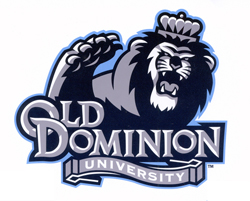 I eventually navigated through the gauntlet of school classes, failed the SAT test miserably and eventually went over to Old Dominion University to take a coordination battery of other tests that would act as a waiver for entry into MMI. I took those tests seriously and the school admitted both my brother and me in 1979. I eventually navigated through the gauntlet of school classes, failed the SAT test miserably and eventually went over to Old Dominion University to take a coordination battery of other tests that would act as a waiver for entry into MMI. I took those tests seriously and the school admitted both my brother and me in 1979.
Marion Military Institute is and remains a 2-year military junior college. The curriculum is tough and day to day military duties are demanding. On top of that, I received a grant in aid scholarship to play junior college football at the institution where we ranked as the number 8 junior college in the NJCAA. I played on the special teams and served as backup quarterback for the Tigers. My brother played wide receiver and we both were commissioned and received follow-on grant and aid offerings to Albany State College in Albany, Georgia.
I was commissioned a reserve Second Lieutenant in May of 1981 and that's the day I decided that I would serve in the US Army. The decision was not as clear as most. I didn't intend on joining the Army until I found out I could/would be commissioned and the idea of a 2-year military college made the trek that much palatable. At that point, I was determined to "Be all I could be" in the Army and would eventually report to active duty as a First Lieutenant in early 1984 after graduating from Albany State.
|
| |
|
Whether you were in the service for several years or as a career, please describe the direction or path you took. What was your reason for leaving?
|
| |
|
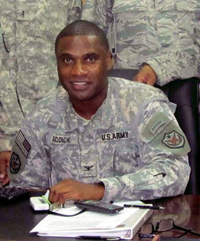 I eventually served over 30 years of active military service with the Army. Spending the first 2.5 years of commissioned service with both the Army Reserve and Georgia Army National Guard, I chose to make the military career although I was not cut out to be a USAR or USARNG Soldier. I don't mean any disrespect but I wanted to lace up my boots every day and the reserve force would not allow me to do that without transitioning to the AGR program. I was not interested in Reserve duty whatsoever and my time in the Ga ARNG solidified my quest to make the active duty service my career. I eventually served over 30 years of active military service with the Army. Spending the first 2.5 years of commissioned service with both the Army Reserve and Georgia Army National Guard, I chose to make the military career although I was not cut out to be a USAR or USARNG Soldier. I don't mean any disrespect but I wanted to lace up my boots every day and the reserve force would not allow me to do that without transitioning to the AGR program. I was not interested in Reserve duty whatsoever and my time in the Ga ARNG solidified my quest to make the active duty service my career.
Marion Military Institute at the time was one of 6 military junior colleges that commissioned young Second Lieutenants. During that time, a 2-year graduate could come on active duty as a 19-year-old Second Lieutenant or opt to finish a four-year degree before weighing future military service options based on a mandatory service obligation. I chose to transfer to Albany State to play out the rest of my eligibility on the football field and besides, they offered me a scholarship (grant in aid) that I leverage along with my reserve pay to fund the rest of my college career.
I reported to Albany State to play football in the late summer. Coupled with a mandatory reserve service obligation, I coordinated with the reserve to postpone my search for a satisfactory unit until the completion of football season. Before signing on with Albany State I talked with the Army ROTC instructor at the institution to see if I could get reserve drill points by helping with the ROTC department as opposed to finding a unit. He worked all the details and this became one of the selling points for selecting Albany State as my follow-on institution.
The ROTC deal fell through and I eventually found an Infantry unit in Americus, Georgia. I was commissioned an Infantry Officer so taking on a platoon leader position with the second battalion one hundred and twenty-first infantry regiment, Company A proved to be a natural fit. I began drilling with the unit in early 1983. 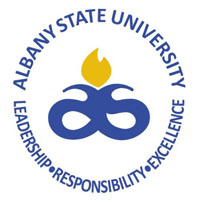 I absolutely abhorred my Company Commander and for reasons of privacy that I will not share in this article was determined to leave that unit as soon as I could receive active duty orders pending graduation from Albany State. Suffice it to say that my college aspirations were not in direct accord with my Commander's state OCS "good old boy" way of thinking. He called me "college boy" to express his disdain for my quest for higher education. It became a little complicated when he dropped the "college" from the title and insisted on shortening the expression for reasons I don't care to express nor would it be fair to implicate him publicly without giving him a chance to share his side of MY STORY. I absolutely abhorred my Company Commander and for reasons of privacy that I will not share in this article was determined to leave that unit as soon as I could receive active duty orders pending graduation from Albany State. Suffice it to say that my college aspirations were not in direct accord with my Commander's state OCS "good old boy" way of thinking. He called me "college boy" to express his disdain for my quest for higher education. It became a little complicated when he dropped the "college" from the title and insisted on shortening the expression for reasons I don't care to express nor would it be fair to implicate him publicly without giving him a chance to share his side of MY STORY.
Anyway, my goal to pursue an Army career was never shaken. I eventually graduated from Albany State and reported to active duty in 1984 where I remained for the next 30+ years until April 2014. The ride was good and enjoyed every assignment and especially loved the soldiers I worked with along the way.
After retirement, I worked as a consultant for a small government contracting outfit. I served as the company's cybersecurity guru as I eventually picked up that skill set while serving on active duty. I was well prepared to work in the IT industry before leaving active duty.
In 1987 while serving as a Battalion S4 for the 3rd Battalion 1st Infantry Regiment in Ft. Lewis, Washington a newly activated Infantry Battalion to round out Combined Motorized Operations in the 2nd Brigade of the 9th Infantry Division, I encountered a harrowing incident with my then Battalion Commander. 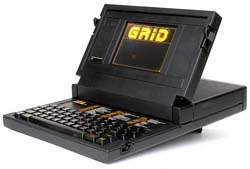 You see, we'd just received a new "ruggedized" laptop computer called the "GRID" to assist in administrative and logistics operations. Each battalion trained a small group of soldiers in every staff position. The Officers did not receive training and we were beholding to the young enlisted Soldiers charged with doing everything from preparing reports to printing slide decks for eventual presentation. I never concerned myself with these complicated machines. In fact, I swore I'd never deal with computers since taking a basic computer course at Albany State in the early `80's. I never understood programming and didn't understand the purpose of the punch cards and how they impacted computer operations. I blindly relied on my computer operator to be the subject matter expert for everything S4 related in the battalion. You see, we'd just received a new "ruggedized" laptop computer called the "GRID" to assist in administrative and logistics operations. Each battalion trained a small group of soldiers in every staff position. The Officers did not receive training and we were beholding to the young enlisted Soldiers charged with doing everything from preparing reports to printing slide decks for eventual presentation. I never concerned myself with these complicated machines. In fact, I swore I'd never deal with computers since taking a basic computer course at Albany State in the early `80's. I never understood programming and didn't understand the purpose of the punch cards and how they impacted computer operations. I blindly relied on my computer operator to be the subject matter expert for everything S4 related in the battalion.
One day, my operator SP4 Habinger reported for a mandatory dental appointment. He'd struggled with dental issues and finally worked up enough nerve (after being classified as non-deployable) to see a dentist. This was the exact day that we were finalizing our staff input for a major operations order to support the Division's annual Octofoil Focus training exercise in Yakima Firing Center Washington. The brigade was on tap to participate in the Army's Test and Evaluation Program also known as an ARTEP.
On this particular day, the Battalion Commander mosied down to my office to ask that I rewrite a section of the battalion's logistics plan for the operation. I said "roger that sir" knowing that I'd have to wait until Sp4 Habinger returned to fix it on the computer. He never returned and after the commander queried for the 4th time, I panic began to set in and I called friends to assist with pulling this report off the computer. I had no clue how to operate that device and my goose appeared to be cooked. I found "no love" from friends and the Bn Cdr returned to my office but this time with a scowl and frown. He demanded that I run the report now so he could make changes and ordered me to get the report off the computer myself. I recall asking him if he knew how to turn on the computer and he replied, "I'm not a damn Captain" and stormed out the room with a final order to get that report to his desk right away.
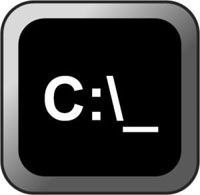 After fiddling on my hands and knees I managed to find the power strip that I'd seen Sp4 Habinger manipulate to turn on the computer. Once I turned it on my troubles began. I had no clue as to what "c:\" meant and I was stumped. That night I told my wife also and Army Officer to meet me at the PX and we search for a computer so that I'd never be professionally embarrassed again. I eventually met a lifelong friend who helped me sort through the selection and eventually assisted in purchasing a computer that would change my life. After fiddling on my hands and knees I managed to find the power strip that I'd seen Sp4 Habinger manipulate to turn on the computer. Once I turned it on my troubles began. I had no clue as to what "c:\" meant and I was stumped. That night I told my wife also and Army Officer to meet me at the PX and we search for a computer so that I'd never be professionally embarrassed again. I eventually met a lifelong friend who helped me sort through the selection and eventually assisted in purchasing a computer that would change my life.
I learned every aspect of computing from 1987 to present. I started with copying disk operating system (DOS) commands to a card file that I kept in a recipe box on my computer desk. I filed each command in alphabetical order and eventually learned how to type the DOS commands by memory. When I noticed that my screen resolution didn't match that of computers at division headquarters, I learned how to change the video graphics card and my love for computers took me in a totally new direction. I learned to program, manipulate databases, network with 10 base T connectors and use every program popular at the time from PFS Write to DBASE III Plus. I was, in fact, the local computer expert because I vowed to never be professionally embarrassed again. My love for computers and life-long learning experience prepared me for many opportunities including a 6-year stint teaching Cyber Security and Global Enterprise Networking and many other processes driven courses.
My career took some unusual turns. I served in the Infantry from 1981 to 1988 and was forced branched (not branch detailed) to the Military Intelligence Corps while still assigned to 3/1 Infantry. My boss seeking the best opportunity for me because I kicked butt as his S4 helped me put together an appeal to remain in the Infantry as he'd selected me to command a company. 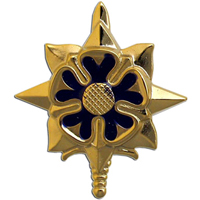 Unfortunately, it was turned down and I waited out the Top Secret investigation process before eventually requesting to control my own fate and switch to the Transportation Corps. My thought was that I'd be able to land a job if things were to go wrong. The MI Corps just didn't seem promising to me and I was not prepared to compete with what I thought were egg heads in the MI field. Unfortunately, it was turned down and I waited out the Top Secret investigation process before eventually requesting to control my own fate and switch to the Transportation Corps. My thought was that I'd be able to land a job if things were to go wrong. The MI Corps just didn't seem promising to me and I was not prepared to compete with what I thought were egg heads in the MI field.
I went on to the TC Advanced Corps in Ft. Eustis, Virginia in 1989. I continued to pursue my passion in computing and became the local subject matter expert for friends and family in the area of computing. My love for that activity led me to build and network computers for myself and as a "side gig" while stationed at garrison assignments around the world. I eventually attended the 53A school (Systems Automation Course) and transitioned to the "real" computer world in the Army in 2002 after finishing my last logistics assignment in Taegu, South Korea where I was assigned as the assistant G4. I had another official title but that's what I did, worked as the number 2 man in the 19th TSC in Taegu, S. Korea.
Prior to all of my exploits with computers and before completing my final logistics job and moving on to the world of the 53A, I experienced a life-changing event. During my time as a truck Company Commander in Mannheim, Germany in the early `90's, I did what I thought was my best performance as an officer today. Making the transition to the Transportation Corps was relatively easy and I considered command as the next logical step albeit with trucks, females and an overwhelming over the road mission on some of the toughest and most dangerous roadways in the world. After all, I was an Airborne Ranger qualified former Infantryman with a 200-pound ego and command was easy as far as I was concerned.
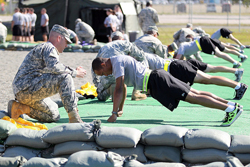 Despite the transition to TC which did prove to be a bit challenging with regard to demographics and differing attitudes about enthusiasm and morale, I found my Soldiers to be responsive and motivated. I challenged them to the limit and imposed tough training standards. We did PT 5 days a week because most drivers found themselves on the road 2-3 times weekly. To make PT work I had to give it to them daily knowing that some would miss the regimen because of conflicting driving schedules. Despite the transition to TC which did prove to be a bit challenging with regard to demographics and differing attitudes about enthusiasm and morale, I found my Soldiers to be responsive and motivated. I challenged them to the limit and imposed tough training standards. We did PT 5 days a week because most drivers found themselves on the road 2-3 times weekly. To make PT work I had to give it to them daily knowing that some would miss the regimen because of conflicting driving schedules.
I also imposed new standards of training incorporating performance-oriented training (I called it POT) based on real-world scenarios. For example, I planned a training session on our little Kaserne in Spinelli Barracks that challenged Soldiers to complete a squad level race incorporating realistic obstacles along the way. They had to don NBC gear, fix a disabled truck, transport casualties, retrieve a huge M915 truck tire and do basic Soldier skills testing along a 3-mile route. This one act in the beginning of my command set the tone for my outstanding Soldiers in the 598th Transportation Company (Medium Truck) and they knew that they performed to the company's motto "Above the Best".
I was blessed with commanding another company MCT Mannheim immediately following my tour with the 598th. The MCT was a much smaller unit with an even more laid back mission. I attacked the command the same way I did with the 598th and received an outstanding report upon completion in 1992.
I then reported to Florida State University to serve as an Assistant Professor of Military Science in the school's ROTC program. That assignment was what the Army considered a break after two successive operational tours. I enjoyed working with the cadets and started my first Master's Degree program at Florida A&M University where my wife was assigned as an APMS as well. We planned to have kids during that assignment but our lives took a drastic turn for the worst.
The Army started a massive drawdown after the Gulf War and we were both caught up in the collateral damage. She transitioned to the AGR program and completed 20 years of active service as planned. I, on the other hand, 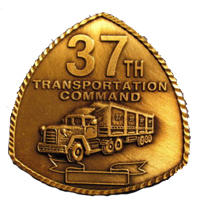 suffered a devastating blow. I was not picked up for Major and left the Army in 1994 as a result of a simple administrative error that cost me much pain and anguish. You see, I received a center of mass report card in my first assignment as a Company Commander. The 37th TRANSCOM Commander my senior rater had to restart his senior rater profile to send a clearer message to the board about his outstanding officers. My report card happened to be due at the time of this transition. I was placed in the 2 block of the report as a matter of "change of profile" protocol. That report was filed with old profile data and I appeared to be a below center of mass officer since all of my peers we placed in the top block in his old profile. suffered a devastating blow. I was not picked up for Major and left the Army in 1994 as a result of a simple administrative error that cost me much pain and anguish. You see, I received a center of mass report card in my first assignment as a Company Commander. The 37th TRANSCOM Commander my senior rater had to restart his senior rater profile to send a clearer message to the board about his outstanding officers. My report card happened to be due at the time of this transition. I was placed in the 2 block of the report as a matter of "change of profile" protocol. That report was filed with old profile data and I appeared to be a below center of mass officer since all of my peers we placed in the top block in his old profile.
I had no reason to check the profile because the words said it all. It explained the 2 block positioning and the Commander gave me very good marks across the board. Anyway, I was eventually passed over to promotion to Major at Florida State despite an appeal to have the rating reflect the senior rater's intent. He actually provided the first letter of support to my appeal but it was still denied and I left active duty on my birthday in 1994. This would not be the end of my story.
|
| |
|
If you participated in any military operations, including combat, humanitarian and peacekeeping operations, please describe those which were the most significant to you and, if life-changing, in what way.
|
| |
 |
| Dust storm...proudly displaying my state flag. |
I'll start with the last deployment combat mission first since it is my only true deployment to a combat theater to date:
I deployed to Operation New Dawn in 2011, 2 months before President Obama declared we'd redeploy all troops. I reported to the 18th Airborne Corps Headquarters in Al Asad, Iraq to work on the General's Staff. We were all awaiting the final word on the number of troops to remain in theater at the end of operations. I was immediately selected to head the Command and Control element responsible for maintaining continuity of base operations in Kirkuk, the northern and one of the most violent areas in Iraq during the war.
I met with several Generals and began planning. My staff consisted of Air Force and Army officers. I had a staff from S1 to S6 but they didn't hold the titles since it was a temporary assignment. They deployed to Al Asad from as far away as Kuwait. We worked for several weeks planning the C2 for the operation that would give continuity to base operations while the incoming and outgoing Brigade Combat Team leaders conducted Battle Handoff (BHO) operations. Once complete the new BCT Commander would work with the civilian installation manager to set the conditions for ongoing base operations. My team would then redeploy to Kuwait to complete our deployment obligation.
President Obama announced the final number of troops to stay in Iraq, 500 and most would remain in Baghdad to work with the embassy. Six bases were to remain open and all offensive operation resources would deploy to Camp Virginia across the border in Kuwait. Combat Commanders would remove 50 Caliber machine guns from the remaining Counter-Rocket and Mortar (CRAM) warning systems leaving stray rounds to be tracked but not destroyed. In sum, we were left with no capability of fighting but had access to an Army of disaster if we could hold out long enough while under attack.
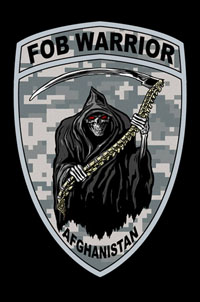 My team conducted reconnaissance missions to Kirkuk (Forward Operating Base [FOB] ) Warrior prior to the redeployment of forces. Before the announcement was made, we moved to FOB Warrior and worked with the outgoing BCT commander and installation manager. When the announcement was made, we were told that we'd be staying in Kirkuk to start Air Operations training with civilian contractors. Our first mission was to reconstruct the now shrinking perimeter. My team conducted reconnaissance missions to Kirkuk (Forward Operating Base [FOB] ) Warrior prior to the redeployment of forces. Before the announcement was made, we moved to FOB Warrior and worked with the outgoing BCT commander and installation manager. When the announcement was made, we were told that we'd be staying in Kirkuk to start Air Operations training with civilian contractors. Our first mission was to reconstruct the now shrinking perimeter.
Up to that point, the enemy in Kirkuk continued to lob 57mm rockets on the compound but we were protected by a defensible CRAM system. They'd average 3-15 rounds a day when the base was still combat ready. A soldier was killed when a rocket landed in the vicinity of his hooch just days before redeployment. A young lieutenant was killed on one of the final patrols. We had been on base only a short time when these casualties occurred. I experienced 2 ramp ceremonies within 2 weeks and they drove the point home that we were not in Kansas anymore despite the media's report that all fighting ended after the start of New Dawn.
When the word settled kin that we'd be maintaining base operations permanently, our mission changed. I now became a Site Lead or Base Commander as my boss in Baghdad exclaimed on my officer evaluation report (OER).
The most interesting thing about our situation was the initial flight into Kirkuk where were programmed to stay to initially provide continuity of operations. Our Army Sherpa did a roll as we approached the landing strip. The flight was only 45 minutes from Al Asad but challenging just the same. The pilot dropped a few flares and I saw all kinda battle noise outside the window before we landed.
It took me nearly a lifetime to get to a combat zone and I thought I'd missed it with the start of New Dawn. I couldn't be further from the truth The enemy kept dropping rockets on our base for the next 12 months. The troops finally departed on November 17, 2011, and we kept the base operational until closing it down in late September 2012.
I was left with a handful of troops, a hospital staff, thousands of contractors, a state department element and other resources I am not at liberty to share. Once I reduced the perimeter, I partnered with my Iraqi Air Force counterpart who now controlled the airfield once belonging to FOB Warrior's US Air Force Elements. I had to provide security to contractors who were now charged to work on that side of the base.
One could go on for hours discussing the logistics and operation aspect of running a base under hostile fire, but suffice it to say, it was a ride every day and the rockets never ceased. I can say that we didn't lose anyone to hostile fire but I can't say we didn't get hit nearly every day. I can share many defensive combat stories but my most vivid memory comes in the form of a power outage that occurred in February 2012.
We'd just settled in on the fact that we were staying. Up to that point, we were all poised to redeploy based on pending SOFA and operational issues with the Iraqi government. We'd been attacked nearly every day at all times but we never lost power. On this particular night, I was doing the Skype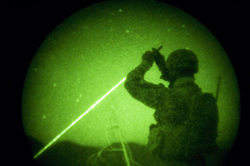 communications routine with my wife when the base went dark. I contacted my battle defense team and they were on it. Generators kept defensive measures operational at the gates but my battle drill required me to shut down the gates until we resolved the power issue. I went to my Battle Defense Operations Center (BDOC) to look at camera positions around the base. We identified a vehicle moving towards the perimeter traversing the gate's serpentine. I quickly drove to that gate only 2 miles or so away. communications routine with my wife when the base went dark. I contacted my battle defense team and they were on it. Generators kept defensive measures operational at the gates but my battle drill required me to shut down the gates until we resolved the power issue. I went to my Battle Defense Operations Center (BDOC) to look at camera positions around the base. We identified a vehicle moving towards the perimeter traversing the gate's serpentine. I quickly drove to that gate only 2 miles or so away.
When I arrived, the driver had stopped but was just moving forward slowly without headlights. I gathered my African Contractor Guard Force and moved forward despite the risk. By this time, I was convinced that no one would enter my perimeter even if I had to die trying. I drew my service revolver and walked towards the vehicle. My guards "cocked" their weapons. Through an interpreter, I had the passenger leave the vehicle. He exited screaming, "COL Riddick COL Riddick don't shoot, it's me Dr. Walli".
Dr. Walli was a former BCT interpreter who was hired by the state department. He coincidentally landed at the international airport in Irbil, Iraq and came down with his cousin on the open and dangerous road. I nearly killed him that night but all was good and peaceful when a State Department rep came to the gate to receive him. They just didn't tell me he was coming via privately owned vehicle.
We resolved the power issue and continue operations. We continued to endure rocket attacks for the next8 months but everyone survived. All of the Soldiers assigned to that base including me, received Combat Action Badges for our efforts and actions while assigned to the only base under constant attack after Operation New Dawn. We survived.
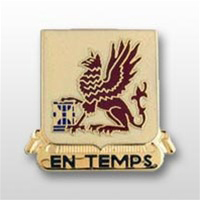 Just as the Gulf War started, I deployed my company to a field exercise in the Lampertheim Local Training Area (LTA) just outside of Mannheim. At about day 4 when my troops were hitting their limit, I was called in to meet with the Battalion Commander to discuss possible deployment to Southwest Asia. He presented a Top Secret brief with potential deployment scenarios and declared that the 598th would deploy if called to task. He wanted to leverage my former Infantry background and aggressive training regimen because he thought we were best suited for the task. Did I mention that my soldiers were on their last leg during that field exercise when I got the call to report to the 28th Trans Battalion headquarters for the Top Secret brief? They'd never been to the field like that and to boot, my mess section borrowed a Mobile Kitchen Trailer to support meals in the field. It was not a part of my equipment list (MTOE) but my Senior Dining Facility Manager SFC Dianna Chester (Wynn) knew that I wanted to make training realistic and took the initiative to borrow the equipment from a local combat unit. My soldiers were at their limit when I got the news. Just as the Gulf War started, I deployed my company to a field exercise in the Lampertheim Local Training Area (LTA) just outside of Mannheim. At about day 4 when my troops were hitting their limit, I was called in to meet with the Battalion Commander to discuss possible deployment to Southwest Asia. He presented a Top Secret brief with potential deployment scenarios and declared that the 598th would deploy if called to task. He wanted to leverage my former Infantry background and aggressive training regimen because he thought we were best suited for the task. Did I mention that my soldiers were on their last leg during that field exercise when I got the call to report to the 28th Trans Battalion headquarters for the Top Secret brief? They'd never been to the field like that and to boot, my mess section borrowed a Mobile Kitchen Trailer to support meals in the field. It was not a part of my equipment list (MTOE) but my Senior Dining Facility Manager SFC Dianna Chester (Wynn) knew that I wanted to make training realistic and took the initiative to borrow the equipment from a local combat unit. My soldiers were at their limit when I got the news.
The 598th never got the call but I did deploy my mess section headed by SFC Chester (Wynn). She met the standard and returned a few months later with all personnel accounted for and not equipment lost in the fray. She was a helluva NCO; a Sergeant Morales Award winner and first-class performer. Her Soldiers were motivated and confident. She reflected my aggressive attitude and took care of her soldiers on and off the battlefield.
I also deployed my number one platoon leader LT Joan Sweeney along with several truck drivers. LT Sweeney was as tough as nails and a real fireball. I knew she'd be a confident and poised leader under fire and when tasked with providing a platoon leader to deploy with a sister company, she was the first on my list. I'm proud of her accomplishments and even prouder that she carried the 598th into battle albeit a small conflict on the scale of things. Her soldiers performed admirably and Above the Best.
My first real-world mission was to provide transportation support for Kurdish relief support mission at the conclusion of the Gulf War. I was to have a truck platoon on standby ready to transport MRS's from a warehouse in Batten Wurtenberg Germany to the terminal at Rhein Mein airport in Frankfurt. Once alerted, my platoon responded in time but one of my trucks wrecked on the Autobahn and my soldier was evacuated by air to a nearby hospital where she recovered from her injuries.
I didn't get my first deployment orders until I left active duty. In 1996 while working as an instructor at a small computer training company in Tampa, Florida where my wife was assigned as an AGR officer to a local Military Police unit, I volunteered for Active Duty for Special Work as I remained on the roles upon leaving active duty 1.5 years earlier. As a matter of course, the Reserves promoted me to major in 1994 but I didn't join a unit nor was I of the right mind to once again be relegated to Reserve Forces Duty. This no means a "swipe" at my fellow reservists but reflects my attitude about serving with the Ga ARNG. 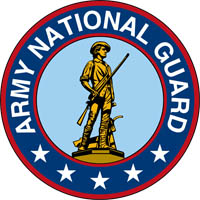 I volunteered for duty in Bosnia. Hadn't worn a uniform since leaving active duty but I was still fit to fight. I worked hard to recover from 2 knee reconstruction surgeries prior to leaving active duty. I injured my right knee in a flag football accident while playing with the cadets at Florida State. Was using a 32-year-old body to make 19-year-old moves and torn my ACL, broke my patella and tore my meniscus. Did the same thing to the other knee a year later after recovering. This time, I did it while playing a pickup basketball game during evening PT. Had to work hard to get back in condition so I was ready when I volunteered for the Bosnia assignment. I volunteered for duty in Bosnia. Hadn't worn a uniform since leaving active duty but I was still fit to fight. I worked hard to recover from 2 knee reconstruction surgeries prior to leaving active duty. I injured my right knee in a flag football accident while playing with the cadets at Florida State. Was using a 32-year-old body to make 19-year-old moves and torn my ACL, broke my patella and tore my meniscus. Did the same thing to the other knee a year later after recovering. This time, I did it while playing a pickup basketball game during evening PT. Had to work hard to get back in condition so I was ready when I volunteered for the Bosnia assignment.
I did not make it to Bosnia, however. After training at the CRC in Ft. Benning, Georgia in August 1996, we hopped a C130 straight to Rhein Mein where I was plucked from the roster to report to Hanau where I eventually served as Battalion S3 for the 414th Base Support Battalion under LTC Russ Bucy. I received credit for Operation Joint Endeavor, however, but I chose not to wear the service ribbon associated with the mission since I never set foot in Bosnia. I spent my time running operations for the 414th in Hanau in what would prove to be a defining position that would carry me to full Colonel in the Regular Army.
|
| |
|
Was there a particular incident during your service when you believed you were in a situation you might not survive? Please describe what happened and what was the outcome.
|
| |
|
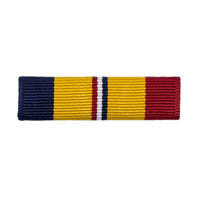 The assignment to support Operation New Dawn should have been a piece of cake but it turned out to be a helluva ride. We were attacked nearly daily with rocket fire. I had no real fear of being hit but I was reminded of how dangerous the location was on many occasions when rockets hit close to my locations. I have the CAB to prove it too but it was a learning experience I'll always appreciate. The assignment to support Operation New Dawn should have been a piece of cake but it turned out to be a helluva ride. We were attacked nearly daily with rocket fire. I had no real fear of being hit but I was reminded of how dangerous the location was on many occasions when rockets hit close to my locations. I have the CAB to prove it too but it was a learning experience I'll always appreciate.
|
| |
|
Of all your duty stations or assignments, which one do you have fondest memories of and why? Which one was your least favorite?
|
| |
|
I literally loved every assignment and would do them all over again if given the chance. Iraq however, can do without a Riddick for the next 1000 years, however.
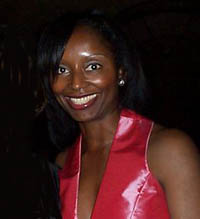 Our assignment to Germany was a dream come true. My wife Brenda had commanded 2 Military Police companies by the time we deployed and I was set to compete for command at my first transportation unit. We settled in Mannheim and lived in the Benjamin Franklin Village guest hotel for nearly 2 months before moving into our government rental housing program (GRHP) apartment in downtown Ludwigshafen. Our assignment to Germany was a dream come true. My wife Brenda had commanded 2 Military Police companies by the time we deployed and I was set to compete for command at my first transportation unit. We settled in Mannheim and lived in the Benjamin Franklin Village guest hotel for nearly 2 months before moving into our government rental housing program (GRHP) apartment in downtown Ludwigshafen.
Mannheim was a large city and we lived literally across the bridge. The commute took about 20 minutes on a good day to my duty station at Spinelli Barracks where I was initially assigned as the Assistant Operations Officer (S3). My job for the first few months was to develop the operations order for REFORGER '89. I was welled versed in operations orders and didn't find this mission tasking at all, however, my Transportation Officer peers thought I'd created an amazing detailed document. Heck, we did this in our sleep in the Infantry.
The Battalion Commander gauged my work and watched me execute the mission. I had a lot of good non-commissioned officers and soldiers to execute what turned out to be a flawless transportation support plan. During the planning phase and within days, I was afforded the opportunity to travel to the various deployment sites and unit storage areas in Belgium and southern West Germany (Bavaria). I'd only been to Germany on temporary duty status (TDY) once before and it was literally my first time living abroad so I soaked in all the travel.
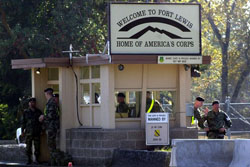 I took command in February of 1990. The 598th Transportation Company would be my baby for the next 18 months. It was the first time I'd worked with females and I found the NCO leadership somewhat different than that of the old crusty Vietnam era NCOs in my rifle company at Ft. Lewis. They were more tuned to technical detail than the killers in Ft. Lewis. They were a bit challenging to work with when it came to taking care of soldiers too. The troops considered my rough because I was an Airborne Ranger type. The word spread about my qualifications the day I landed in country. I took command in February of 1990. The 598th Transportation Company would be my baby for the next 18 months. It was the first time I'd worked with females and I found the NCO leadership somewhat different than that of the old crusty Vietnam era NCOs in my rifle company at Ft. Lewis. They were more tuned to technical detail than the killers in Ft. Lewis. They were a bit challenging to work with when it came to taking care of soldiers too. The troops considered my rough because I was an Airborne Ranger type. The word spread about my qualifications the day I landed in country.
The company struggled with accidents as we had a heavy lift (lowboy) mission and pulled regular M915 truckloads simultaneously. Some of the troops couldn't transition fast enough and neglected the challenges associated with different loads so they wrecked a lot. Fortunately, they didn't get hurt and kill anyone on the Autobahn. The just created havoc at times and kept me in front of the commander's desk.
My fondest and most heart-wrenching memory of service was when I gave up command of the 598th. I truly loved those Soldiers and they gave me 1000% every day. We had our challenges but I couldn't have asked for a better command. My first sergeant and most of the officers still keep in touch to this day. As a matter of fact, we had our 2nd reunion in Atlanta earlier this summer (2015). Soldiers of all stripes came from far and near to talk about and reminisce about the fun times in Germany and in particular, the 598th Transportation. It proved to be my most rewarding assignment of all.
Now I don't discount my combat experience and team in Iraq. I truly enjoyed the soldiers and civilians in that domain as well but the mission was stressful. We made the best of times and endured some really challenging moments. I consider it my greatest accomplishment in life but the 598th Transportation Company will always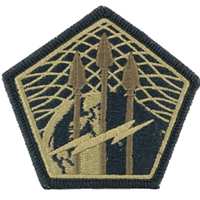 be the best for me not to mention the beauty of Germany. And by the way, we were there when the wall fell. The sites and sounds associated with that historical event will remain indelible. be the best for me not to mention the beauty of Germany. And by the way, we were there when the wall fell. The sites and sounds associated with that historical event will remain indelible.
My worst or least favorite assignment was with the Army's new Cyber Command, my final duty assignment. I was scheduled to report to Ft. Belvoir as a primary staff officer in this command after returning from Iraq. Perhaps my ego was inflated as I did command the last elements of base operations in northern Iraq before closing shop but I found ARCYBER downright challenging.
Upon arrival, I reported early to learn the lay of the land. I met with all my assigned officers and most of the staff 2 weeks before reporting for official duty. I'd received a phone call a few months prior from a former colleague who notified me about the assignment. She assured me that everything was set, confirmed my position and warned me to get ready for big responsibility. I knew nothing could be as challenging as getting fired at every day so I took her warnings in stride and prepared for the transition 30 days after I returned from the war.
I showed up ready to work about 2 weeks after my initial site survey. My SGM and motivated Master Sergeant prepared my office and I attended several meetings in my designated position. I received a call from the command's Chief of Staff at home after my first full day of work and was reminded that we hadn't met. He quickly told me that the command was not aware of my assignment and told me I'd be working 25 miles north in what I considered to be a non-essential 06 position. They say that the decision to retire becomes clear in one fell swoop and they are right. I made up in my mind that night that I was going to retire and just had to be quiet for the next 9 months or so to reach my active duty goal of 30 years. I retired on time and that's the end of that tale, my worst assignment EVER.
|
| |
|
From your entire service, including combat, describe the personal memories which have impacted you most?
|
| |
|
 I'll never forget the faces of the Soldiers who lost their lives under my watch. I didn't personally see any of my troops die in combat or as a result of combat wounds but I did experience the loss of a few while serving in various positions around the world. I'll never forget the faces of the Soldiers who lost their lives under my watch. I didn't personally see any of my troops die in combat or as a result of combat wounds but I did experience the loss of a few while serving in various positions around the world.
My first troop loss was a young private from a small western town. We deployed for training to Yakima Firing Center in Washington to participate in the 9th Division's annual training event, OctoFoil Focus. I'd just arrived and was assigned to a light rifle platoon leader. Because I'd already spent several years of inactive duty with the Ga ARNG, the job would be a cake walk and we didn't have to worry about the maintenance of the pesky M113's we had in the guard. My sole responsibility was to make sure we got to our objective with the will to fight.
I had a young soldier who proved to be a troublemaker in garrison. He was a great field infantryman but couldn't hold his liquor in garrison. He was scheduled to return to Ft. Lewis in the middle of the training cycle to meet with his attorney. He'd managed to get a serious article 15 before deploying and need counsel. He took the bus back as soldiers did from range control in Yakima. It was a regular run and we did it all the time.
Once he arrived on Ft. Lewis his bad habits caught up with him and he found himself drunk and out of control with little supervision. He eventually did something stupid and accidentally killed himself before having a chance to grow up. The memory of his death will always haunt me.
I also lost a bright young officer who was taken by a deranged NCO in the prime of her life. She was assigned to my team at the Army's ROTC advanced camp in Ft. Bragg. All members assigned to Cadet Command spent time at Ft. Bragg assisting with the advanced camp. This LT had just received her commission from a very prestigious school in the northwest. She received an RA commission so they assigned her to assist at camp pending her officer basic course report date.
Our team worked protocol and we never took a day off for nearly 6 weeks. The cycle finally slowed down and we were set to have a weekend of leisure. I briefed my team (all brand new 2LTs) on the safety aspects of Ft. Bragg and we agreed to meet at the officer's club for a celebratory drink. This young and very attractive officer drew a lot of attention when she finally arrived. Unfortunately, she drew the attention of a deranged NCO who eventually followed her and murdered her in the BOQ. This single act of selfish uncontrolled anger or mental illness will burn in my mind forever. The Army lost a star who had yet to position herself in the universe of leadership and responsibility. I will never forget this young lady and pray that she rest in peace.
Every time we lost a soldier, I realized that the job and responsibilities we place in their care are the most demanding and dangerous job of all. I don't discount their sacrifices and cherish their enthusiasm to keep this country safe. I'll always hurt when I hear of a fallen comrade. They are truly America's finest and I'm proud to have served with her best!
|
| |
|
What achievement(s) are you most proud of from your military career?
|
| |
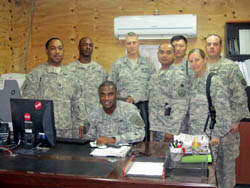 |
| My leadership team in Iraq...before they left us. LOL! |
Despite the seemingly insurmountable hurdle I overcame in the second quarter of my career, I managed to complete or get selected for all levels of schooling commensurate with my grade and position. Combat duty eluded me for many years. I didn't deploy to any combat zones until the twilight of my career. Now you can consider me foolish but I wanted to deploy. I found myself scrambling for a position in Iraq and didn't get the opportunity until Operation New Dawn. What was I thinking? A 50-year-old man needs to be home on the couch at that station in life. Instead, I chose to volunteer for deployment.
The days and nights in Iraq were challenging. I didn't worry about myself because I know my day will come. I was trained and motivated. I worried about my soldiers and civilians. I didn't deploy for an award or recognition. I deployed because I refused to leave the service without a combat patch. I equaled to a qualifying degree to me as far as I was concerned. I was afraid of being the only old soldier on the bench in the park in the twilight of my career without a war story to share. Again, what was I thinking?
We were attacked over 383 times so says my Combat Action Badge recommendation. I received around only yards from my sleeping quarters. I recall questioning whether or not I wanted to hit the deck that day but decided to roll over at the last minute and the round hit just mere yards from my hooch. Rocks and shrapnel peppered the top of the building but fortunately, the T-Wall (blast wall) stopped the shrapnel from making a direct hit to my flimsy double-wide trailer. I survived that particular attack but was reminded of how we like to send young men to battle because us old fools (should) know better.
I received a Bronze Star and Combat Action Badge for my service in Iraq. These are some of my most rewarding awards. I also earned the Ranger Tab and thought it to be the most high and honorable until I felt the fear of death and overcame battle without losing a Soldier.
|
| |
|
Of all the medals, awards, formal presentations and qualification badges you received, or any other memorabilia, please describe those which are the most meaningful to you and why?
|
| |
 |
| Shadow box presented by my wife Maj(r) Brenda Riddick |
Thirty-Two years and nine months is a long time for sure and I spent them all as a commissioned officer. As a result, I received many awards. The COMBAT ACTION BADGE by far is the most rewarding however and I did receive 6 Meritorious Service Medals. The first MSM was ordered in my first active duty assignment before taking my first command which came later in Germany during my next assignment. I received another (2nd Award) MSM before PCS'ing from my first assignment with the 9th Infantry Division (Old Reliables). I was quite surprised with the first award because it was a rare for a non-command captain however, I did start up the newly activated 3/1 Infantry Battalion S4. Those lateral transfers and incoming equipment orders were an everyday thing since we didn't have any equipment at the start. Before my team and I departed we elevated the supply on hand level from critical to fully operational. I guess the Battalion Commander (Jon B. Dodson) thought those late nights and long weekends deserved some sort of recognition.
The CAB award goes without saying. We were attacked by rocket fire from the day I entered Kirkuk in late September 2011 till I departed a year later. Never did I figure I could be so scared at the sound of that alarm until the end of that particular round of rockets but I managed to survive with a straight face. Always admired looking at old soldier pictures sporting the CIB and didn't figure the CAB as an option as the thought of such award exited my mind when the last units pulled out in November 2011 but low and behold my troops and I earned it in high fashion. I now have PTSD as a result but I wouldn't trade a thing and I'm sure I'll shake the fear of loud explosions one day soon.
The other awards including my retirement award came with the assignments. All are meaningful but I must admit that I couldn't wait to retire from my last command so the Legion Of Merit lost its significance. I'll never say that I hated a command but I sure didn't like the way I was treated in my last days of active duty. Thank God for the professionalism of my staff and peers. Without them, I would have lost my cool. Nothing like getting hosed when a retirement is an option. You simply pull the pin and boom, it's over.
|
| |
|
Which individual(s) from your time in the military stand out as having the most positive impact on you and why?
|
| |
 |
| LTG Caslen & me.....Kirkuk, Iraq cir 2012 |
Of course, I met plenty of mentors and friends along the way. My first Platoon Sergeant in the Georgia Army National Guard SFC Jerry Pearlman was by far the most influential non-commissioned officer I had the pleasure of meeting in my career (active and reserve). I was a 20-year-old 2nd Lieutenant when we met. As an Infantryman, I knew the basics of training as a cadet. I served in the guard before I attended the Infantry Officer Basic Course so I was really green. SFC Pearlman made sure I understood my role as Platoon Leader.
After our initial weekend drill "get acquainted" meeting, he scheduled a PL/PSG training weekend for just he and I. He took me to a designated training area near Americus, Georgia and told me we were to dig a 2-man fighting position. He and I toiled in that hard Georgia clay for 2 days until we had the position finished. We set out aiming stakes, cleared fields of fire, drew range cards, linked in with positions to our left and right and chopped small Georgia pines with our entrenching tools for overhead cover. I was exhausted before the end of drill on that Sunday. We used to ride together from Albany where I was finishing my Bachelor's Degree so we had time to talk about the training and his intent. He told me to always be mindful of my orders and the load they put on Soldier's backs. Digging that position for 2 days in the sun and clay reinforced his point to be a compassionate leader and to never assign a task to a soldier that I wouldn't be able to perform. That's a lesson I carried with me for the remaining 31 years.
Major Tom Jervis (XO, 3/1 Inf.) was my best supervisor, hands down. He was a no-nonsense West Point Grad who pissed vinegar. He was thorough in all aspects of leadership. He mentored and loved but wasn't afraid to chew you out in a heartbeat. He kept me on my toes for my entire time with 3/1 Inf. I admired his tenacity of purpose, professionalism and down to earth approach to leadership. How anyone could fail under his tutelage is a mystery to me and he no doubts recommended me for the first MSM.
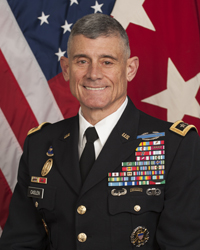 Finally, LTG Robert Caslen was by far the best General Officer I had the honor of serving with in my career. He took the reins of Iraq from GEN Lloyd Austin at the close of Operation New Dawn and transitioned the HQ to OSC-I. He gave me the responsibility of being Site Lead (commander) of OSC-I Kirkuk, my last operational assignment, and command. Like Jervis and Pearlman, he led by example. Traveled all around Iraq to personally assure the security of outposts and stations. Spent countless hours directing, leading and politicking with State Department leadership while maintaining an improbable force that took no casualties despite the rise of the now infamous ISIS. A strong-willed leader, he was involved with every aspect of Iraqi operations during a time when the world thought we were out of that country. I will forever be grateful for serving under his command. Helluva man! Finally, LTG Robert Caslen was by far the best General Officer I had the honor of serving with in my career. He took the reins of Iraq from GEN Lloyd Austin at the close of Operation New Dawn and transitioned the HQ to OSC-I. He gave me the responsibility of being Site Lead (commander) of OSC-I Kirkuk, my last operational assignment, and command. Like Jervis and Pearlman, he led by example. Traveled all around Iraq to personally assure the security of outposts and stations. Spent countless hours directing, leading and politicking with State Department leadership while maintaining an improbable force that took no casualties despite the rise of the now infamous ISIS. A strong-willed leader, he was involved with every aspect of Iraqi operations during a time when the world thought we were out of that country. I will forever be grateful for serving under his command. Helluva man!
|
| |
|
Please recount the names of friends you served with, at which location, and what you remember most about them. Indicate those you are already in touch with and those you would like to make contact with.
|
| |
 |
| Fellow Omega Men - Friends for life! |
I had a ready assembled set of friends no matter where I traveled in the Army. My fraternity brothers of Omega Psi Phi Fraternity, Inc. were always positioned in the far reaches of the world ready to greet another brother. I would be remiss in mentioning any without acknowledging all but I can tell you they were always pre-positioned and ready to provide the basic needs of support and friendship wherever I traveled.
Captain Victor Addison a fellow transporter and I were best friends. He wasn't an Omega Man but we hit it off from the start at the Transportation Officer Advanced Course in Ft. Eustis, Va. We commanded truck companies in Germany together and he ended up in Tampa after leaving the Army in the early 1990's. I just happen to wind up in the same area during that time as well. We maintained a lifelong friendship and talk all the time. I consider his sons my nephews and my wife and his "ex" are friends to this day as well.
I also share an indelible bond with one of my first Platoon Leaders in the 598th Transportation Company. LTC(r) Phil Benefield and I are friends. He honored me by allowing me to be a groomsman in his wedding to his lifelong best friend Kim and they're married with 3 kids living in Georgia and doing great things. This friendship is probably the most improbable of all. I thought he was a bit ragged around the edges when he first reported and I made it my life's work to make him a strong officer. He passed with flying colors and I'm proud of all his accomplished and continues to do after the Army. He currently teaches JROTC in a small town and we chat from time to time.
My first company first sergeant Dan Weireman is my wing-man battle-buddy "ace boon coon" for life. He taught me much and we learned together. I love that man!
I did have a personal connection with an NCO who never knew how much we had in common. It was my duty to remain professional but I'm sure SFC(r) Paul Shirley and I would have been best of buddies in another life. I kept the relationship professional but I could tell he was my type of friend that I never got a chance to hang out with. Would like to reconnect with him in the near future.
|
| |
|
Can you recount a particular incident from your service which may or may not have been funny at the time, but still makes you laugh?
|
| |
 |
| 1LT Riddick, Support Platoon Leader HHC 3-1 Inf. 9ID |
I recall my first field exercise as a battalion support Platoon Leader. I was my first non-ground pounding infantry assignment. The platoon had trucks and equipment to support an infantry battalion logistical requirement. I slept in a real tent during this exercise and site locations were predictable unlike trekking through the woods with an infantry platoon and sleeping wherever and whenever you could.
At the end a particularly challenging Division-wide field exercise in Yakima Firing Center, Washington we set up a GP Medium tent to house the platoon as we prepared to redeploy to Ft. Lewis. At that point in the exercise, I could move the entire platoon in to sleep after daily requirements were finished. It was cold so we fired up the old "pot belly" stove for heating and cooking. Of course, we had a fire watch at all times but I was afraid of the tent for many reasons. My primary fear was "roll over". As an Infantryman, we stressed finding a secure sleeping location that provided shelter and egress from tracked vehicles in the woods. Invariably, a soldier was killed at various points during training exercises as a result of a tracked or wheeled vehicle roll over.
I slept cautiously each night because of the stove and the number of vehicles traversing the terrain for various reasons. During stand down, logistics trucks ruled and it was nothing for a driver to stray off course so I literally slept with one eye open. One night while sleeping I felt a particularly hard thump to my head. I was sound asleep when I was struck so I woke thinking a truck was rolling over me so I put my arm out and rolled to prevent disaster. At the same time, I heard one of my NCO's yelling at the top of his lungs "sir we gotta fire" as he paraded around the stove that had caught the top of the tent on fire. Wind knocked the GP medium over and the stove was burning the canvas. He screamed for at least 5 minutes until I gathered my thoughts, assessed the situation and realized we were not getting run over by a truck.
My Platoon Sergeant finally added some common sense to the equation and he and a handful of soldier stamped out the fire. Looking back I remember being so afraid only to realize I was not getting run over by a truck nor were we going to die by fire. SSG Langley is credited with creating that humor.
|
| |
|
What profession did you follow after your military service and what are you doing now? If you are currently serving, what is your present occupational specialty?
|
| |
 |
| The civilian: COL(R) Tony Riddick ('15) |
Life in the military takes a soldier through unpredictable changes at times. I performed three distinct jobs while serving to include infantry, transportation and information systems (now titles cybersecurity a new branch in the Army). I was always focused on the afterlife so I carefully selected my options as I traversed the twists and turns of Army life. I changed from Infantry to TC when they tried to force me into the Military Intelligence field thinking I'd have a better chance at employment if I'd have to leave the service. Because of a hurdle I had to jump later in my career, I asked to be transferred to the IT side because I'd picked up an affinity for computers as a result of a serious butt chewing from my Battalion Commander in Ft. Lewis. Decided I'd never be caught short-handed again by failing to understand technology.
So I because of a defense contractor in the Information Technology arena after retiring. I actually started working while on terminal leave. This was a big mistake because I never gave myself time to wind down. As a result, I only worked one year and now I spend time doing guest lecturing and public speaking events when invited. My stint at the National Defense University as a Professor of Systems Management continues to pay off.
In September of 2016, I was called by the Governor of the United States Virgin Islands to interview for the Chief Information Officer position for the Government. My wife and I move to the territory in November 2017 where I've served as Director of the Bureau of Information Technology and Chief Information Officer for the territory, a Senior Executive cabinet position. I'm truly blessed but we were hit by 2 category 5 hurricanes recently and recovery has been tough. Fortunately, Army life was a little tougher and I have the strength for the fight!
|
| |
|
What military associations are you a member of, if any? What specific benefits do you derive from your memberships?
|
| |
|
I've had the honor of joining the MOAA, VFW and a number of other military-related clubs and organizations.
|
| |
|
In what ways has serving in the military influenced the way you have approached your life and your career?
|
| |
 |
| My brother (LTC[r] Lorenzo Riddick) & I (1LTs) in IOBC cir '84. A family affair |
I have been in some sort of uniform since my days in Navy Junior ROTC at Granby High School in Norfolk, Virginia. As a resident of the city that houses the largest military installation in the world, I've found that I've been influenced since I can literally remember my stepfather driving to his job in VA 47 at the Oceana Naval Base in Va. Beach. It's always been a part of my life and I continue to offer guidance and advice to officers who reach out to me on a daily basis.
It is the structure of my fiber that's given me discipline and a love of country. The military made me more patriotic than I'd probably dare to be as a citizen in this country. I take ownership of the flag and the principles that make our country great as a result of my affection for those who serve and served with me for a very brief but meaningful time in my life. I owe much to the military and I pay it back every day I'm allowed to enjoy the freedom provided by those who sacrificed some and those who gave all to make this country great. It is simply who I am and I did it for a long time!
|
| |
|
Based on your own experiences, what advice would you give to those who have recently joined the Army?
|
| |
|
 The military is a profession of arms staffed with highly motivated men and women. It's truly not a job but a lifestyle built on principles that make our country great. My advice to all who may dare to honor this country with service is to be proud and know that what you do helps to keep this country great. There is no greater sacrifice in peacetime or in war. It's a starting point for many and an end for an unfortunate few but they live on in the colors that drape our nation. Be true to your commitment and know that sacrifice is your watchword. The military doesn't give you anything. It's one of the last of a dying breed of institutions where you have to earn your stripes with sweat and tears and if need be blood. ABOVE THE BEST! WARRIOR 6! The military is a profession of arms staffed with highly motivated men and women. It's truly not a job but a lifestyle built on principles that make our country great. My advice to all who may dare to honor this country with service is to be proud and know that what you do helps to keep this country great. There is no greater sacrifice in peacetime or in war. It's a starting point for many and an end for an unfortunate few but they live on in the colors that drape our nation. Be true to your commitment and know that sacrifice is your watchword. The military doesn't give you anything. It's one of the last of a dying breed of institutions where you have to earn your stripes with sweat and tears and if need be blood. ABOVE THE BEST! WARRIOR 6!
|
| |
|
In what ways has TogetherWeServed.com helped you remember your military service and the friends you served with.
|
| |
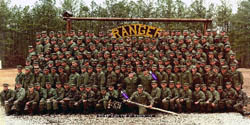 |
| Ranger School '84/'85 class 3-85 Ice Cold Charlie |
TWS provides a look to the past. Here we can see our brothers and sisters struggle to uphold Duty, Honor & Country. It helps me to reflect on all that was and all that will be with regard to our nation's power and dominance. I enjoy reading the articles and reflecting on those who've served to be they short timers of lifers like myself. A great way to connect!
|
| |
| |
|
|
|
| |
Get Started On Together We Served
Watch our video and see what TWS is all about
|
| |
|

|
| |
|
|
|
|
|
|